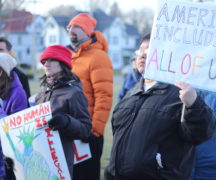By JAN LARSON McLAUGHLIN
BG Independent News
Help wanted signs have become a routine part of the landscape in the Bowling Green area – indicators of the dire need by many employers to fill shifts.
The labor shortage is the result of a decline in the working-age population and the reluctance of some to return to the workforce after COVID-19, according to local economic development and labor officials.
“We have more people retiring than people of working age” joining the labor force, said Mojabeng Kamala, coordinator of Welcome BG, during a recent lunch and learn program on the local labor shortage.
A panel of labor and immigration specialists suggested that one solution for employers is a shift in focus toward the recruitment and hiring of immigrants – people who may not look or sound like their traditional workforce.
“Open your mind to a whole other workforce,” said Mechelle Zaron, an immigration attorney. “Rethink your recruiting for a new world and immigrants.”
One local manufacturer representative shared that company’s success in hiring and retaining non-English speaking and immigrant employees.
Two years ago, a non-English speaking person came into the lobby of Pinnacle Plastics, seeking work. The business had one bilingual employee who helped the Spanish-speaking person apply, said Rose Britner, of Pinnacle Plastics.
“This woman is still with us today,” Britner said.
Two years later, 10% of the plant employees are non-English speaking, and four translators are on staff.
“We rely on translators to communicate with us,” Britner said.
Plant announcements are posted in English and Spanish. And language apps are used if translators aren’t available.
Two Spanish-speaking employees have been awarded “employee of the month” recognition, Britner said.
The success of Pinnacle in attracting non-English speaking employees is due to the company’s willingness to make accommodations for them. News of that positive treatment of such workers spreads, and leads to more applicants, Britner said.
“I believe the best form of advertising is word of mouth,” she said, noting that 37.5% of new hires were referred by current employees. “Once you welcome someone, they have friends and associates.”
“Hiring is an important part of a successful business,” Britner said. “We are recruiting for people who want to work – and want to show up for work.”
Bowling Green Economic Development Director Kati Thompson said filling shifts is the most critical need for local employers.
“In any conversation on economic development, the topic of workforce rises to the top,” Thompson said. “This is driving us all to solutions we haven’t thought of before.”
Britner suggested that local employers be willing to make accommodations.
“Be open,” she said, noting her company’s creating part-time positions for BGSU students who can’t work full-time. She talked about a student from Egypt hired by Pinnacle.
“He’s a very valuable member of our team for over a year,” Britner said.
If a workplace isn’t welcoming, word will spread about that as well, Kamala said.
“The economy of our community hangs on this,” she said. “Embrace what they can offer” from their different cultures.
Baldemar Velasquez, president of the Farm Labor Organizing Committee, talked about the changes in farm labor rules that led to the recruitment of undocumented workers.
“Then the anti-immigrant wave hit the area,” Velasquez said.
Farm labor changed again in the last three to four years, when independent contractors began providing seasonal workers.
“Many of them are not directly hired by employers,” he said. “Many farmers like that because they distance themselves from legal issues.”
But in some cases, the contractors violate labor rules and skim off the top of wages – leading to problems for the workers and the farmers, Velasquez said.
“It pits workers and small family farmers against each other,” he said. “We’re all in this together – manufacturers, farmers and farmworkers.”
While Americans have traditionally not protested immigrant labor being brought in to do seasonal farm work, many dislike the idea of bringing in foreign labor to fill manufacturing or hospitality jobs, according to Velasquez.
Zaron talked about the resistance to legalize undocumented workers to help solve labor problems.
“The lack of a political will to solve this problem is the problem,” she said. “There’s just not enough line workers who want these jobs.”
The U.S. policies to reduce undocumented workers have actually led to an increase.
“Our laws really encourage people to stay here and go underground,” Zaron said. “We created this problem with our policy.”
Meanwhile, many people are “scapegoating immigrants for every problem America has,” she said.
The influx of immigrants into cities with “welcome” programs is saving those cities, Zaron said. Business needs to speak up and demand the ability to hire immigrants – with authorization.
“The strongest, most powerful voice in America is business people,” she said.





